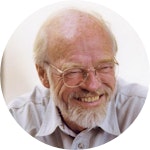Introductory Note:
In this vintage interview we get a glimpse behind the scenes of Eugene’s pastoral goals in writing the book Christ Plays in Ten Thousand Places, which looks at the practical aspects of living out the Christian life in our modern world. He says, “Theology without spirituality is dead, while spirituality without theology is mushy. I was hoping to get them together, wed them, get them integrated, correlated.” May this conversation between two old friends steady us and guide us in the way of Jesus.
Grace Pouch
Content Manager
Richard J. Foster: Would you share why you chose the title, Christ Plays in Ten Thousand Places, from a poem by Gerard Manley Hopkins, and what you’re trying to convey by it?
Eugene Peterson: Hopkins, who uses language in a very fresh, earthy, Celtic way, has meant a lot to me. This phrase is from a sonnet that begins “As kingfishers catch fire, dragonflies draw flame;/ As tumbled over rim in roundy wells/ Stones ring …” and so on, picking up a number of images. The last few lines then focus on Christ: “For Christ plays in ten thousand places,/ Lovely in limbs, and lovely in eyes not his/ To the Father through the features of men’s faces.” That’s been in the back of my mind for years as a text for the integration of the outward creation and our inward spirituality: Christ without us, and Christ within us, Christ before the foundation of the world, Christ loving us and Christ redeeming us. So I had a title long before I wrote a book.
RJF: Can you help us get a sense of why you wrote the book, and what you feel it might add to spiritual formation or discipleship?
EP: I’m not the first to be concerned about this. Others have done it also. I’ve been a pastor most of my life, and it’s distressed me that the people who are interested in theology aren’t very much interested in spirituality. They tend to be academics or students or love to have Bible studies. On the other hand, the people who are interested in spirituality and prayer, small groups, or retreats have no interest in theology. And the split — and this is not recent; this is historic — has become more and more apparent with the high, growing interest in spirituality in our time. I don’t know that it’s any wider; it’s just more conspicuous. Theology without spirituality is dead, while spirituality without theology is mushy. I was hoping to get them together, wed them, get them integrated, correlated.
Throughout the book I emphasize and shape and ground everything in Scripture. Everything is shaped in a Trinitarian structure with a sharp focus on the kerygma of Jesus — Christ in his birth, Christ in his death, Christ in his resurrection. Spiritual theology is very specifically focused in Jesus as the Christ — Jesus born, crucified, raised — and not Jesus as a generalized figure.
RJF: So, the title communicates a very high Christology?
EP: Yes.
RJF: Can you help us understand what you’re hoping people will gain from the book, the take-home value?
EP: I think Christ Plays in Ten Thousand Places has been out a year now, and I’ve had a lot of confirmation that what I hoped is in fact happening. People are realizing that everything is integrated in this Christian life. You can’t specialize: you can’t specialize in Moses or in Paul or in Jesus. This is one big story. It’s not only a story of faith, it’s a story of the world in which faith takes place. So what I’m hoping to do is tear down all these walls that we erect between different departments — history, biblical studies, theology; laity and clergy, secular and spiritual — so the reader not only gets a sense of the theological complexity of everything we’re doing, but also discovers a consistent, organic unity. So if we put our finger on any part of the spider’s web, everything is affected.
RJF: Wonderful. Since this is the first book in a series on “spiritual theology,” maybe it’s best to help us know first what you mean by that phrase. Then, maybe you could say a word or two on what the other four books are going to be about.
EP: Spiritual theology is not a new concept. I think the phrase occurred for the first time in the late Middle Ages. For the first thousand years [of the Church] there was not theology or worship or liturgy; it was an integrated Christian life. Theology and Spirituality weren’t divided up. With the rise of the universities in the twelfth century, things became divided. The cathedral schools took care of theology and the monasteries took care of prayer, and we’ve never quite gotten them back together again.
Ellen Charry has the wonderful phrase “sapiential theology” — theology for living as opposed to a more scientific focus where you learn the facts. It’s wise living, it’s whole living, it’s healthy living.
Of the five, Christ Plays in Ten Thousand Places is the foundational book. In it I’m trying to introduce this whole concept of the organic unity integrated with the grounding of Scripture, this Trinitarian structure and the kerygmatic focus. Actually, I’m calling these conversations. These are not dogmatic pronouncements. Spiritual theology — or maybe I should just say the Christian life — requires dialogue.
So I tried to keep a certain element of informality in my writing — tell stories, use poems, whatever helps to invite a conversational readership. The subtitle of this first volume is A Conversation in Spiritual Theology.
The title of the second book is Eat This Book. It’s a conversation on reading Scripture, the spirituality of reading, which again requires participatory action. It’s like St. John eating the book, eating the scroll of Scripture, getting it inside of him. Then it explodes in these incredible visions in the book of the Revelation. Not only in the visions, but in the life of the people.
I think my title for the third volume will be The Jesus Way. And I take the metaphor of Jesus as the way and explore it in every dimension I can figure out.
We can’t say Jesus is the way — ”I’m going to follow Jesus” — and then use all the devil’s ways. All the “I like to do” or “have a talent for” or “have an aptitude for” or “have a spiritual gift” language is popular in our churches, but we have to do it Jesus’s way. The way Jesus did it is as important as the way Jesus is. I’m just trying to connect ways and means. The means by which we do something can destroy what we’re doing if they’re not appropriate. And I think the American Church is very conspicuous for destroying the way of Jesus in the ways we do church.
My title for the fourth volume is Tell It Slant, a phrase from poet Emily Dickinson. Originally it was to be on spiritual direction, but it’s expanded now or it’s changed focus to consider the way we use language, the spirituality of language. I’m taking two foci: Jesus and his stories, which is basically the parables, and Jesus in his prayers. What I’m trying to deal with is conversation, the way you and I are talking right now. We sometimes think of spiritual conversation as talking about God or the soul, but in reality it is the way we use language when we’re talking to our kids — ”Pass the potatoes” — and when we’re talking with God — ”Give us this day our daily bread.” We’re using the same language, dealing the same words.
Spiritual direction is an intentional form of paying attention to the everydayness of our lives. But I’d like to expand the imagination to include the way we talk around our supper tables, the way we talk to a clerk in the check-out line at a grocery store, the way we talk to our children or spouses or friends when we’re not aware of talking about God or our soul. Jesus is conspicuous for doing that in the parables.
The final book … by the way, Jan, my spouse, very immodestly I think, has been calling this “The Peterson Pentateuch” … will be on spiritual formation. I’ll use the book of Ephesians as my text, and the emphasis will be on spiritual maturity: how we become whole, how we become well developed, how we grow up in Christ. Ephesians is Paul’s most mature letter and is perfectly designed for this. I think all of Paul’s other letters are ad hoc. They were sparked by some controversy or some misunderstanding or something local that was going wrong. But Ephesians is different. There’s no problem in the church at Ephesus; only the issue of Christians growing up, of becoming spiritually mature.
RJF: What do you hope this series cultivates in individuals and the Church at large?
EP: I hope I make at least a modest contribution toward developing an imagination that is less sectarian, less subjective and more biblical, more Trinitarian so that we get out of our tiny ghettos where we’re fighting for and trying to defend all these little causes and doctrines. I would like to introduce people into a world that’s integrated, that’s whole in which Christ is the definition and the presence of this wholeness.
We are at a crisis in the American Church. I don’t know enough about the rest of the world to speak about it, but our rhetoric is louder and more abrasive. Our relationships are shallower, more superficial. We have an enormous amount of energy in churches in this country, and I would like to do with my readership what I’ve tried to do as a pastor: get them to take their lives seriously in the wholeness of Christ, not for what they can get out of Christ. I would like to make a dent in the debilitating consumer mentality that has beguiled religion and faith in this country.



